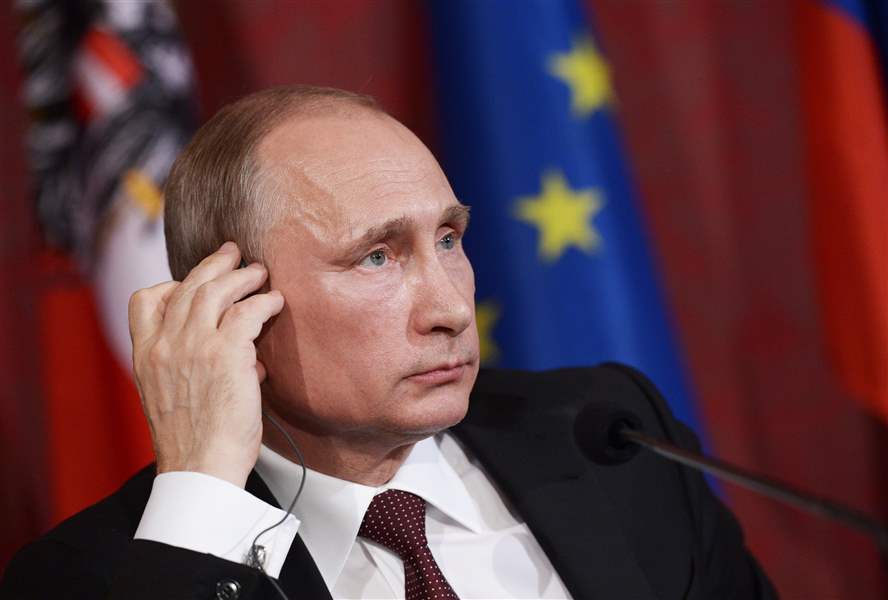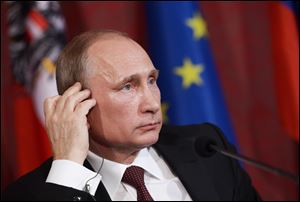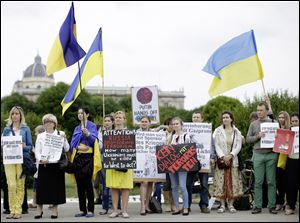
Putin: Weeklong cease-fire could be extended, accompanied by talks
6/24/2014
Russian President Vladimir Putin attends a news conference after his meeting with Austrian President Heinz Fischer in the Hofburg Palace in Vienna, Austria.
ASSOCIATED PRESS

Russian President Vladimir Putin attends a news conference after his meeting with Austrian President Heinz Fischer in the Hofburg Palace in Vienna, Austria.
MOSCOW — Russian President Vladimir Putin today urged Ukraine to extend a cease-fire and launch talks between the government and the rebels as he moved to de-escalate the crisis by asking lawmakers in Moscow to rescind a resolution that allowed him to use the military on the Ukrainian soil.
Even as rebel fighters downed a Ukrainian helicopter, Putin said the weeklong cease-fire announced Friday by Ukrainian President Petro Poroshenko should be accompanied by talks that would give people in the mostly Russian-speaking east a sense of security and protect their rights.
“We hope that the cease-fire will be extended and it will be used for substantive talks,” Putin said on a trip to Vienna. He blamed Ukrainian forces for breaking the cease-fire today by launching an airborne raid in the eastern city of Slovyansk, the flashpoint in the two-month insurgency.
Ukraine’ military said nine servicemen were killed when one of its helicopters was shot down in Slovyansk. Vladislav Seleznev, a spokesman for the Ukrainian operation against the rebels in the east, said that the rebels downed the Mi-8 helicopter with a shoulder-fired missile.
RELATED ARTICLE: U.N. estimates 423 killed in Ukraine‘s east
The downing of the helicopter marked a sharp escalation of tensions, amid a cease-fire that has mostly held since early Monday. The rebels pledged to respect it following talks later in the day.
Earlier today, Putin asked parliament to cancel a resolution, which he once favored, sanctioning the use of Russian military force in Ukraine — a move that reflected his desire to avoid a new round of Western sanctions.
Poroshenko heralded the Russian leader’s move as a “practical step” toward bringing peace to a region roiled by a separatist insurgency.
A Kremlin statement said Putin had asked the head of Russia’s upper house of parliament to cancel his March 1 request authorizing the use of force on Ukrainian territory. The pliant chamber is expected to quickly rubber-stamp the move Wednesday.

Demonstrators with Ukrainian flags protest against Russian President Vladimir Putin on occasion of his visit to Austrian President Heinz Fischer in Vienna.
Putin said he made the decision to “help create conditions for peace process,” but added that Russia will continue to protect the rights of Russian speakers in Ukraine. “I hope that armed forces will not be needed for that,” he said.
Putin needs to show his support for Poroshenko’s peace plan ahead of Friday’s European Union summit to avoid further Western sanctions. The EU has warned it could introduce new sanctions that would target entire sectors of the Russian economy if Moscow fails to help de-escalate the crisis.
The Brussels-based ambassador of one EU member state, speaking on condition of anonymity because of the sensitivity of the subject, said Russia’s actions appear finely calibrated to just fall shy of the threshold that would trigger retaliatory economic measures by the bloc that would really bite.
At the same time, Putin may feel that he no longer needs to maintain the threat of an invasion to protect Moscow’s interests in Ukraine.
Poroshenko’s peace plan contains promises of decentralization and guarantees for protection of rights of Russian speakers, which Russia has demanded from the start of the crisis.
It wants Ukraine to give broad powers to its regions to allow Russian-speaking eastern provinces to maintain close ties with Moscow. A strong regional autonomy would also allow them to effectively block the nation’s accession into NATO, which is the Kremlin’s worst nightmare.
Putin’s request to parliament for the use of military in Ukraine on March 1 came days after Ukraine’s pro-Russian president was chased from power following months of street protests. Russia sent troops that quickly overran Ukraine’s Black Sea peninsula of Crimea, setting the stage for Russia to annex it after a hastily called referendum.
In April, a mutiny erupted in eastern Ukraine, where pro-Russian insurgents seized official buildings, declared their regions independent and fought government troops.
The U.S. and NATO accused Russia of supporting the rebellion with troops and weapons, but Moscow has denied that.
In Washington, White House spokesman Josh Earnest said today the U.S. was “reserving judgment” on Putin’s call to extend the cease-fire, saying it puts more stock in Russia’s actions than its words.
Swiss President Didier Burkhalter, who currently chairs the Organization for Security and Cooperation in Europe, said in Vienna that “we need a cease-fire which lasts longer than five days to be able to start real dialogue,” the Austria Press Agency reported.
Burkhalter, who planned to meet with Putin later today, said the OSCE was open to the idea of observing the cease-fire in eastern Ukraine along with Russian representatives but did not clarify exactly who would partake in any observation missions. He stressed the need for “practical support from Russia to see true progress” in Ukraine.
Russian markets, which have been rattled by the crisis in Ukraine and a host of sanctions by the U.S. and the European Union against Russian officials and businessmen, soared 1.6 percent today after the news, reaching a four-month high.